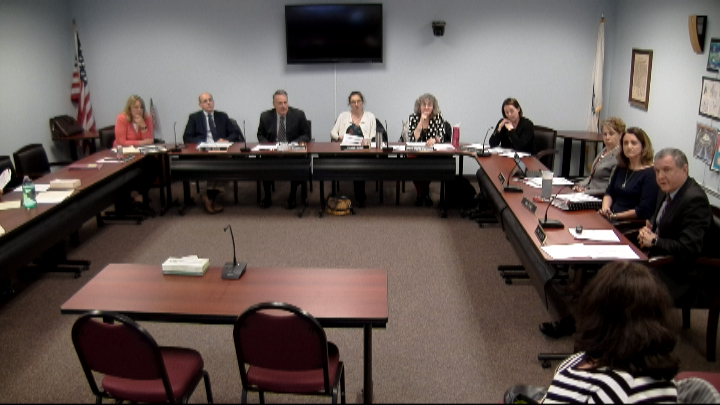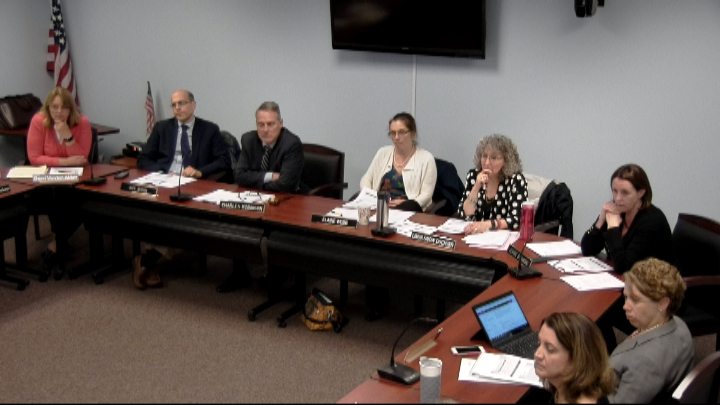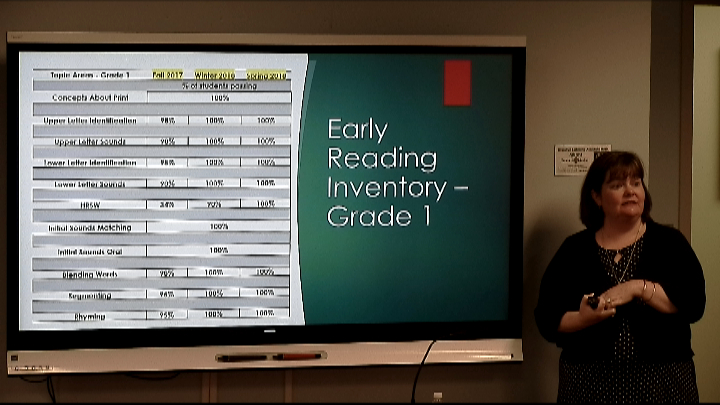 Superintendent of Schools John Doherty gave the School Committee an update on kindergarten enrollment at the June 4 school committee meeting. There are currently 329 students enrolled in kindergarten for the 2018-2019 school year. Forty-two students will be half-day students and 287 will be full-day students. No more full-day students will be accepted. While 32 percent of families requested full-day kindergarten in 2005, that percentage has risen to 87 percent for the 2018-2019 school year. Seventeen classrooms will be used for kindergarten across the district. The full-day classes will have between 20 and 21 students per class and the half-day classes will be populated with between eight and 17 students per class. The half-day classes will be housed at three schools, Joshua Eaton, Wood End, and Killam. All five elementary schools will host full-day students.
Superintendent of Schools John Doherty gave the School Committee an update on kindergarten enrollment at the June 4 school committee meeting. There are currently 329 students enrolled in kindergarten for the 2018-2019 school year. Forty-two students will be half-day students and 287 will be full-day students. No more full-day students will be accepted. While 32 percent of families requested full-day kindergarten in 2005, that percentage has risen to 87 percent for the 2018-2019 school year. Seventeen classrooms will be used for kindergarten across the district. The full-day classes will have between 20 and 21 students per class and the half-day classes will be populated with between eight and 17 students per class. The half-day classes will be housed at three schools, Joshua Eaton, Wood End, and Killam. All five elementary schools will host full-day students.
Doherty also shared that 81 percent of communities in Massachusetts provide tuition-free full-day kindergarten. Only two communities offer no full-day option. Reading’s tuition for full-day kindergarten is one of the most expensive in the state. Some students on Individual Education Plans require that full-day kindergarten is provided. If it were not offered, these students would have to be sent out of district at a high cost. Doherty stated that offering tuition-free full-day for all kindergarten students in Reading would cost in excess of $1 million annually.
Given district priorities of access to full-day kindergarten for families, class size, keeping half-day and full-day classes separate, and keeping siblings in the same school, as provided to the superintendent by the School Committee, as well as the rising percentage of families choosing full-day, Doherty sees challenges in the future keeping half-day classes separate and in all the schools. Limitations include having too few students in a class, and Doherty questions if this is economically or academically feasible. If Reading were to change and limit full-day kindergarten offerings to families, then several families would opt for private kindergarten creating space issues when these students returned to Reading Public Schools in grade one. Doherty also expressed the opinion since those students would not receive the Reading Public Schools curriculum, they would be “behind the curve” as they adapted upon entering Reading schools. There would also be a financial impact to having fewer tuition-paying students as some fixed costs would remain. The current offset for full-day tuition is $980,000.
Doherty also expressed concern that when compared with the general population, a smaller percentage of “economically disadvantaged” families opt for full-day kindergarten despite those families being offered free or reduced tuition for the program. He intends to study the issue.

Committee member Nick Boivin expressed concern about families being required to pay to send their kindergarten student to the local school. “Free access to neighborhood schools should be a priority,” Boivin suggested. Chair Chuck Robinson asked if a presentation should be given regarding mixed full-day and half-day classes versus the split class model that will be used next year. “All the evidence we have is anecdotal,” Robinson commented. “We need to have an in-depth conversation prior to having to make a decision.” he continued.
 Principal Lisa-Marie Ippolito of Joshua Eaton Elementary School gave an update as to the progress of the school. She focused her presentation on three specific school improvement goals, the first being literacy. The school has fully adopted the Readers and Writers Workshop curriculum. In spring evaluations between 98 and 100 percent of students in kindergarten and grade one met or exceeded expectations. There has been an improvement in the benchmark scores for all grades in reading except for grade three. Ippolito explained that third grade is where students begin to make the transition from learning to read to reading to learn. Because of transition, what is tested changes for third graders. Though some loss of progress is expected in the grade, she intends to study the matter further.
Principal Lisa-Marie Ippolito of Joshua Eaton Elementary School gave an update as to the progress of the school. She focused her presentation on three specific school improvement goals, the first being literacy. The school has fully adopted the Readers and Writers Workshop curriculum. In spring evaluations between 98 and 100 percent of students in kindergarten and grade one met or exceeded expectations. There has been an improvement in the benchmark scores for all grades in reading except for grade three. Ippolito explained that third grade is where students begin to make the transition from learning to read to reading to learn. Because of transition, what is tested changes for third graders. Though some loss of progress is expected in the grade, she intends to study the matter further.
The second school improvement goal of family communication was addressed fully in the last update in March, though Ippolito took time to recognize the efforts of the team that produces the school newsletter. Ippolito was able to report that attendance in the third goal, has greatly improved. Though overall attendance has improved only slightly> The percentage of students who have missed ten or more school days has dropped from almost 25 percent to just under eight percent.
Ippolito concluded with sharing about some of the events of the year at Joshua Eaton including a read-a-thon, an upcoming variety show, and special “Principal Times” where she spends time with individual students. Next year Ippolito hopes to continue the progress in literacy while beginning to focus on math skills in the same way. She hopes to update the staff evaluation process and promote project-based learning activities on Friday mornings.
Doherty updated the committee on the search for a new principal at Barrows Elementary School. Finalists have been chosen and there will be an open-microphone question and answer session on Wednesday, June 6 that is open to the community. He expects to name the new principal by the final day of school. The committee also updated liaison assignments.
The School Committee adjourned to executive session at 9:05 pm.
